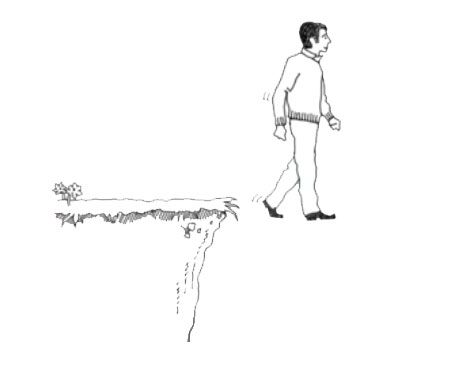Teacher (in a panic): “It can’t be wrong.”
Me (softly): “Why not?”
Teacher: “Because if it’s wrong and I’ve been doing it for years, then what does that mean for the kids?”
Me: “I know, but another teacher said to me, ‘What about the kids we haven’t had yet?’”
To consider that we may be wrong is scary. In her TED Talk, On Being Wrong , Kathryn Schulz asks the audience: “How does it feel, emotionally, to be wrong?”
Audience: Dreadful! [Thumbs down] Embarrassing.
Schultz: “These are great answers but they are answers to a different question. You guys are answering the question, ‘How does it feel to realize you’re wrong?’ Realizing you’re wrong can feel like all of that and a lot of other things, too… But being wrong feels like nothing. When we’re wrong about something, not when we realize it, but before that, we’re like that coyote after he falls off the cliff and before he looks down. We’re already wrong. We’re already in trouble, but we feel like we’re on solid ground. So I should actually correct something I said a moment ago, it does feel like something to be wrong. It feels like being right.”

We need to be careful when taking teachers from a place of feeling right to feeling wrong. I say that as a teacher who has been wrong about many important things and who is currently, no doubt, blissfully unaware of being wrong about more.
In my years of teaching, I’ve been wrong about how kids learn how to read and the instruction they need. I’ve neglected to give adequate support to English Language learners in my classroom. I’ve failed to build a conceptual understanding of mathematical procedures…
But just typing this (incomplete) list has reopened a flood of guilt because, years later, I can still picture the faces of the children impacted by my mistakes.
So when I talk with other teachers about practices that may be problematic, I am keenly aware that I am pushing open their floodgates. That doesn’t mean that I avoid these conversations, but I keep a few things in mind.
- A classroom teacher has little time to process the impact of difficult conversations before she faces her students again.
- Teaching requires clarity of thought and that’s nearly impossible if just below the surface lives anger or shame.
- Any instructional practice we take away will likely need to be replaced with something else.
- Worrying “what should I do instead?” often prompts panicked decisions that might not be an improvement over the original practice.
- Practices we know are problematic feel more comfortable than the unknown so teachers need support until new approaches feel natural.
Influencing a teacher’s practice can benefit every one of her future students, so sometimes it’s tempting to bang our way in. But a contentious relationship rarely allows for as much influence as an alliance and when teacher-guilt floods in (and it will), the deluge of emotion can actually become a barrier to meaningful progress.
So I remind myself that at the present moment, I can’t think of anything I’m wrong about and I like this comfortable feeling. But no doubt, I am wrong about something crucial. How would I like someone to help me face that?

